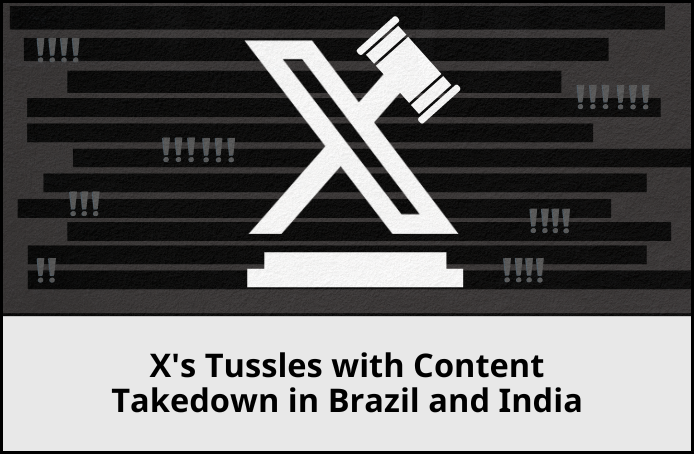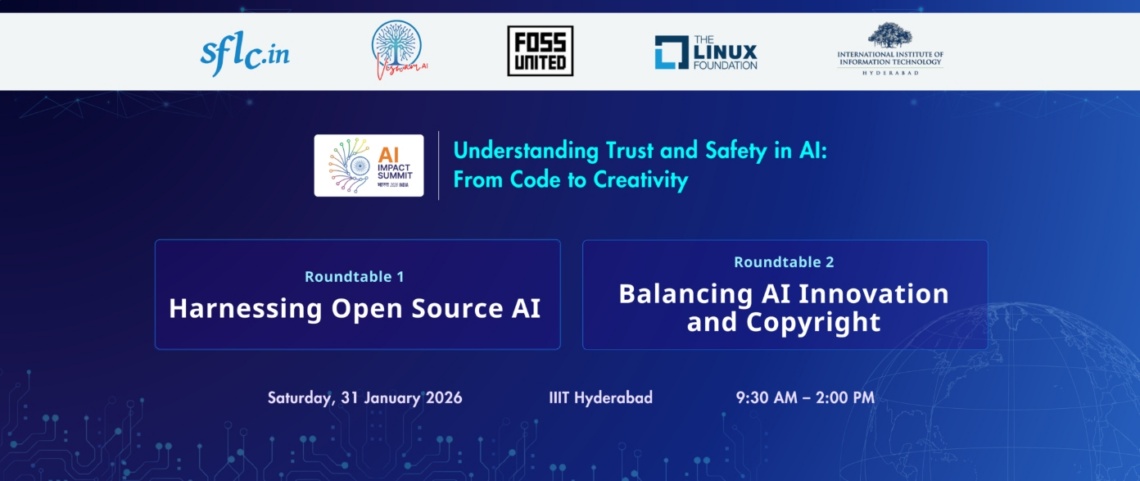Introduction
On 31st August, Brazilian Supreme Court Justice Alexander de Moraes ordered the suspension of social media platform X (formerly Twitter). The Supreme Court of Brazil has based its decision as per a law which mandates foreign companies to have legal representation to conduct operations within the country. Through this blog post, we compare the recent suspension of X in Brazil due to non-compliance with legal obligations with the trend of content takedowns in India.
A(X)ed in Brazil: Supreme Court Justice suspends the Platform
The Supreme Court of Brazil ordered the suspension of X in the country. This has occurred due to their failure to nominate a legal representative in the country. Previously, Justice Alexandre de Moraes issued a court order requiring the social media platform to block accounts that spread fake news and hate speech which were derogatory and political in nature. The court also threatened to arrest the company’s legal representatives for non-compliance, prohibited X from disclosing details of the accounts that were blocked and imposed hefty fines for non-compliance. Elon Musk criticized the judge’s actions as “aggressive censorship” and committed to lift all restrictions. As a result, Elon Musk was investigated for allegedly spreading disinformation, obstructing justice, and for facilitating access for supposedly banned social media accounts to freely express their views.
In its official statement, X expressed concerns regarding censorship and reiterated its commitment to protecting freedom of speech as the reason for defying the court orders and suspension of operations in Brazil. Further, X also stated employee safety as a reason for removal and failure to re-appoint a legal representative.
How the legal scenario of content takedowns on X shapes up in India
The X Transparency Center reveals that India is the 5th highest requestor for legal demands from X. Ironically, Elon Musk’s stances for freedom of speech in Brazil is in contrast to the situation of X’s compliance with content removal orders in India.
Under Indian law, Section 69A of the Information Technology Act, 2000 read with Information Technology (Procedure and Safeguards for Blocking for Access of Information by Public) Rules, 2009 authorize blocking of content posted online. The Karnataka High Court has interpreted Section 69A to mean that the government has the power to not only block online content under Section 69A of the Information Technology Act, 2000 but also user accounts in entirety. Considering the ambit of this power, it is not surprising that India comes under the top five countries where government authorities issue legal demands for content takedown. As per X’s India Transparency Report, X has, most often, taken an action against sensitive adult content, abuse/harassment and ban evasion.
Additionally, the Election Commission of India (“ECI”) had ordered X to takedown posts containing political speech shared from elected politicians, electoral candidates and political parties. X disagreed with such orders citing concerns regarding free speech and expression. However, they chose to comply with the same and withheld such content from the platform. ECI issued orders due to several violations of Model Code of Conduct. Interestingly, X’s Transparency Reports from May to July 2024 reveal a sharp increase in grievances (roughly 370-1100) pertaining to misinformation/manipulation of synthetic media in India.
Liability and employee safety
X had removed its existing legal representative from Brazil when the court had threatened their arrest over non-compliance of takedown orders. X challenged the freezing of its legal representative’s bank accounts. However, the same were either dismissed or ignored. While a legal representative is required as a point of contact to have an oversight over legal compliances, imposing personal and criminal liability on the legal representative seems unnecessary. In a letter, Global Network Initiative recognized the Information Technology (Intermediary Guidelines and Digital Media Ethics Code) Rules, 2021 has provisions which enable “hostage taking”. The Rules contain similar provisions to that of the Brazilian law, by which intermediaries have to appoint a Grievance Officer, Nodal Contact Person for 24 x 7 law enforcement and Chief Compliance Officer as applicable, these officers shall also face liability for consequential actions of the intermediaries. However excessive liability imposed on employees can be counterproductive, as it may cause intermediaries to preemptively censor content in order to avoid liability and “hostage taking” situations to protect their employees’ safety.
Conclusion
The situations in Brazil and India highlight the complexities that social media platforms face amid socio-political contexts and overarching regulatory pressures. While X’s stance to protect freedom of speech in Brazil has led to a complete suspension of its operation in the country, India continues to witness an increasing trend of content takedown orders and account bans.
In conclusion, social media platforms in the digital age play a crucial role in promoting freedom of speech and shaping public discourse. The Indian and Brazilian scenarios exhibit how state actors have to achieve a balancing act between ensuring the right to freedom of speech and expression while also preventing the spread of misinformation.




